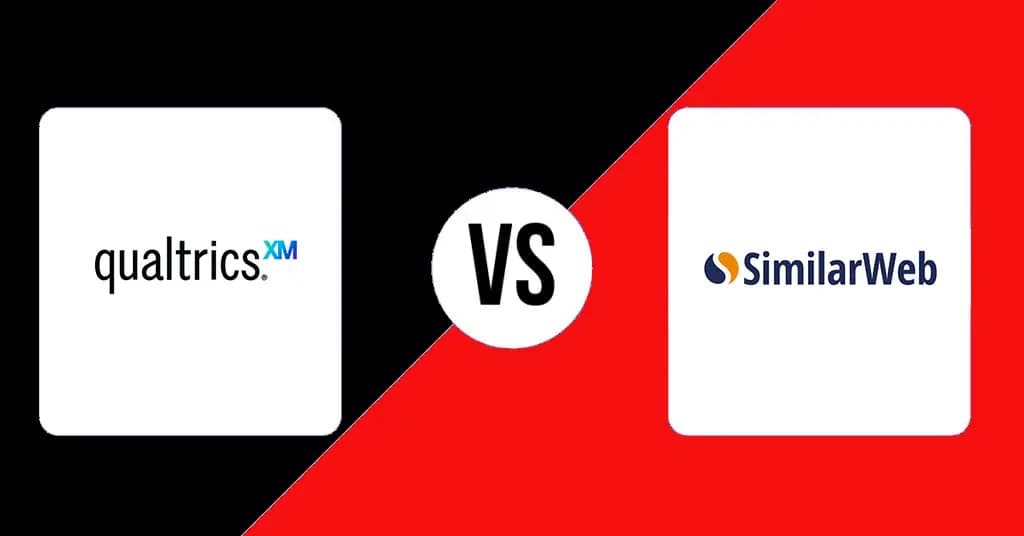Battle of the Analytical Platforms: A Comparison of Qualtrics and Similarweb


Tunica Tech
4 min readMay 1
Qualtrics vs Similarweb: A Comparison of Two Market Research Tools
Market research is an essential aspect of any business, providing valuable insights into customer needs and preferences, as well as helping companies make informed decisions about their products or services. In today's digital landscape, market research tools have become increasingly popular, making it easier for businesses to gather and analyze data. Two well-known market research tools are Qualtrics and Similarweb, which offer a variety of features and capabilities. In this article, we will compare Qualtrics and Similarweb, highlighting their similarities and differences to help you decide which one is best for your business needs.
Overview of Qualtrics
Qualtrics is a cloud-based market research platform that helps businesses gather and analyze customer feedback and data. It offers a wide range of features, including survey creation, data analysis and visualization, and customer experience management. Qualtrics is known for its user-friendly interface and customizable templates, making it a popular choice among businesses of all sizes.
Overview of Similarweb
Similarweb is a market intelligence platform that provides insights into website traffic, audience behavior, and other digital data. It offers features such as website analysis, competitor benchmarking, and market research. Similarweb is known for its vast database, providing detailed information and analysis of millions of websites worldwide.
Feature Comparison
| Features | Qualtrics | Similarweb |
|---|---|---|
| Survey Creation | 🗹 | ✕ |
| Data Analysis and Visualization | 🗹 | 🗹 |
| Customer Experience Management | 🗹 | ✕ |
| Website Analysis | ✕ | 🗹 |
| Competitor Benchmarking | ✕ | 🗹 |
| Market Research | ✕ | 🗹 |
As seen from the comparison table, Qualtrics and Similarweb have different strengths and focus areas. While Qualtrics offers features related to survey creation and customer experience management, Similarweb focuses on website analysis, competitor benchmarking, and market research. Depending on your business needs, you may find one tool more suitable than the other.
User Interface
Both Qualtrics and Similarweb have user-friendly interfaces that are easy to navigate and understand. Qualtrics offers a drag-and-drop editor for creating surveys, making it easy for users to design and customize their surveys. Similarly, Similarweb's interface is visually appealing, with easy access to its various features and analysis tools.
Pricing
Pricing is an important consideration when choosing a market research tool. Qualtrics offers a range of pricing plans, including a free option for individual users. For businesses, their prices depend on the features and number of users required. Similarweb, on the other hand, offers a free trial for its platform, followed by a customized pricing plan based on your business needs.
Integrations
Integrations with other tools and platforms are crucial for businesses, as it allows for seamless data flow and analysis. Qualtrics offers integrations with popular platforms such as Salesforce, HubSpot, and Tableau. Similarly, Similarweb integrates with Google Analytics, Adobe Analytics, and other tools, providing users with a complete understanding of their website's performance.
Customer Support
Having reliable customer support is essential for any software or tool. Qualtrics offers various support options, including phone, email, and chat support, as well as a knowledge base and community forums. Similarweb also provides email and chat support, along with an extensive help center, webinars, and a community forum.
Pros and Cons
Pros of Qualtrics:
- User-friendly interface
- Customizable survey templates
- Data analysis and visualization tools
- Customer experience management
- Integrations with popular platforms
Cons of Qualtrics:
- Limited website analysis capabilities
- Higher pricing for businesses
- Less extensive database compared to Similarweb
Pros of Similarweb:
- Extensive website analysis capabilities
- Competitor benchmarking and market research features
- Customized pricing plans
- Integrations with various tools and platforms
Cons of Similarweb:
- Limited survey creation and data analysis features
- No free plan option
- Less user-friendly interface compared to Qualtrics
Conclusion
In conclusion, Qualtrics and Similarweb are two popular market research tools that offer a variety of features and capabilities. While both have their strengths and limitations, the choice ultimately depends on your business needs and budget. If you require in-depth website analysis and competitor benchmarking, Similarweb may be the better option. However, if your focus is on survey creation and customer experience management, Qualtrics would be a more suitable choice. We recommend trying out their free trials and assessing which tool meets your requirements before making a decision.
Need Help With Qualtrics?
Setup a Quick Call now.
How to Use
Similar types of Tools
- Quick Links
- Homepage
- Projects
- About Us
- What we do
- Careers
- Services
- Product Dev
- MarTech
- Data Analytics
- Our Products
- TrakNeo
- pURL
- Breathe India
- Arivu
- LIFI